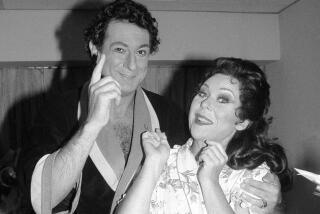Hilde Gueden; Star With Vienna Opera
- Share via
Hilde Gueden, one-time star of the Vienna State Opera and a versatile soprano equally at home with Mozart, Lehar or the Strausses, has died in Vienna, it was learned this week.
Times music critic Martin Bernheimer, quoting a spokesman for the Vienna State Opera (Staatsoper), said the talented and beautiful artist with the ringing voice had died Sept. 17, but news of her death had just surfaced.
Bernheimer quoted the spokesman as saying that she was 71 and died after what was described as “a long illness.”
Miss Gueden, who made her Metropolitan Opera debut in 1951 and seven years later first sang here at the Hollywood Bowl, had last performed in Vienna in 1970, 23 years after her initial appearance there. Most recently she had taught at the Staatsoper studios.
Referred to throughout her celebrated career as “blonde, beautiful and glorious-voiced,” she progressed from lyric roles such as Susanna in “Le Nozze di Figaro” to the more dramatic part of Countess in the same Mozart opera.
She also was Rosalinda in “Fledermaus,” Zerlina in “Don Giovanni,” Musetta in “La Boheme,” Micaela in “Carmen” and Anna Trulove in Stravinsky’s “The Rake’s Progress.”
Born in Vienna of Austrian, Italian and Hungarian ancestry to musical parents, she took piano lessons at age 7 and vocal lessons at 14.
She made her stage debut in Vienna in 1939 in Robert Stolz’s operetta “Servus, Servus” and her operatic debut in Zurich that same year.
In 1941 she was singing with the Munich Opera. One evening Richard Strauss was in the audience and heard her interpretation of Zerlina. He went backstage to meet the young soprano and urged her to learn the role of Sophie in his “Rosenkavalier.” Strauss later sent her a photograph of himself autographed “To my Sophie Gueden” while Time magazine was to write that she had made the role “particularly her own.”
At war’s end she became a regular both with the Staatsoper and La Scala in Milan, but it was in Paris that Rudolf Bing, then manager of the Metropolitan Opera, heard her on tour and invited her across the ocean. For the rest of her career she traversed the Atlantic, developing an enormous repertoire in several languages.
After her Met debut she remade herself physically, trimming her long hair and removing the false eyelashes popular on the European stage. She was trying, she said, to become “an American girl.”
On Tuesday Bernheimer remembered her as “a paragon of the illustrious post-war Vienna Opera who enjoyed what was presumably a friendly rivalry with Elisabeth Schwarzkopf, Lisa della Casa, Sena Jurinac and Irmgard Seefried.”
“Those were lavish times. She was a beautiful woman and a sensitive actress. Although her pure and silvery soprano soared with special poignancy in the music of Mozart and Richard Strauss, she also was a memorable exponent of such Verdi heroines as Gilda in ‘Rigoletto’ (which she sang in the historic Met production designed by Eugene Berman) and Violetta in ‘La Traviata.’ ”
More to Read
The biggest entertainment stories
Get our big stories about Hollywood, film, television, music, arts, culture and more right in your inbox as soon as they publish.
You may occasionally receive promotional content from the Los Angeles Times.










